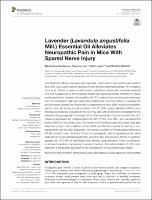Por favor, use este identificador para citar o enlazar este ítem:
https://repositorio.usj.es/handle/123456789/258
| Título : | Lavender (Lavandula angustifolia Mill.) Essential Oil Alleviates Neuropathic Pain in Mice With Spared Nerve Injury |
| Autor: | Sanna, Maria Domenica


Les Parellada, Francisco 

López Ramos, Víctor 

Galeotti, Nicoletta 


|
| Palabras clave : | Lavender essential oil; Central nervous system; Neuropathic pain; Anxiety; Depression; Memory; Feedings |
| Fecha de publicación: | 9-may-2019 |
| Editorial : | Anna Karolina Kiss, Medical University of Warsaw, Poland |
| Citación : | Sanna MD, Les F, Lopez V and Galeotti N (2019) Lavender (Lavandula angustifolia Mill.) Essential Oil Alleviates Neuropathic Pain in Mice With Spared Nerve Injury. Front. Pharmacol. 10:472. doi: 10.3389/fphar.2019.00472 |
| Resumen : | Low treatment efficacy represents an important unmet need in neuropathic pain patients and there is an urgent need to develop a more effective pharmacotherapy. An increasing number of patients choose complementary medicine to relieve pain. Lavender essential oil (LEO) is approved by the European Medicines Agency as herbal medicine to relieve anxiety and stress. However, the capability of LEO to relieve other nervous system disorders such as neuropathic pain has never been established. Our work aimed to evaluate the antineuropathic properties of lavender on a spared nerve injury (SNI) model of neuropathic pain in mice. An acute oral administration of LEO (100 mg/kg) alleviated SNI-induced mechanical allodynia, evaluated in the von Frey test, with an intensity comparable to the reference drug pregabalin. Investigations into the mechanism of action showed that LEO markedly decreased the phosphorylation of ERK1, ERK2, and JNK1, and decreased the levels of iNOS in the spinal cord; involvement of the endocannabinoid system was also detected using in vitro inhibition of the FAAH and MALG enzymes as well as in vivo experiments with the CB1 antagonist. Conversely, no effect on P38 phosphorylation and NF-kB activation was detected. These antihyperalgesic effects appeared at the same dose able to induce antidepressant-like, anxiolytic-like, and anorexic effects. In addition, gavage with LEO did not significantly alter animals’ gross behavior, motor coordination, or locomotor activity, nor impaired memory functions. Oral administration of LEO could represent a therapeutic approach in the management of neuropathic pain states. |
| URI : | https://repositorio.usj.es/handle/123456789/258 |
| ISSN : | 2314-6141 |
| Aparece en las colecciones: | Artículos de revistas |
Ficheros en este ítem:
| Fichero | Descripción | Tamaño | Formato | |
|---|---|---|---|---|
| fphar-10-00472.pdf | 1,53 MB | Adobe PDF |  Visualizar/Abrir |
Este ítem está sujeto a una licencia Creative Commons Licencia Creative Commons

